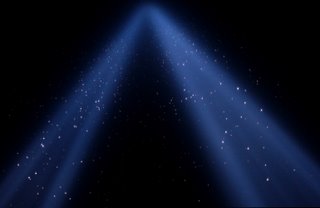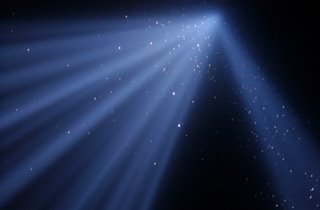
My photographs are taken from a less famous perspective. When you get down to Ground Zero and get really close, you realize, actually, that those big beams of light attract a LOT of bugs (all those little white dots in the photo below). Also? They attract a lot of bats, which come to eat the bugs (the slightly larger white dots). If you listen carefully, you can hear the bats doing their screechy screaming, and it's a little unnerving, frankly.

I think that this five-year anniversary is probably a little more acute for most of us. I personally started working on anniversary articles, tribute pieces, and "Where Are They Now?" stories right after I got back from the beach. It's been an exhaustive week of coverage, all leading up to a special edition discussing where we were and where we are.
The pomp and ceremony of this Nice Round Numbered Anniversary have gotten me thinking about how future generations will mark this day. As a former marching band geek, all I wanted as I fidgeted in my wool uniform was for the self-righteous old people to stop intoning the solemnity of Memorial Day, so we could be released from the Salunga Fire Hall and jump into Grach's pool. Well, that's not really true. I wanted to honor the day, you know, a little bit. And THEN I wanted to jump in Grach's pool.
in 2002, I heard an interview with Sarah Vowell on NPR. I'm not even sure if Ground Zero was even fully cleared at the time. She was talking about her book "The Partly Cloudy Patriot" and historical tourism. She described her somewhat grim habit of spending her summer vacations at sites of (bloody) American history. Back in 2002, the interviewer, Terry Gross, I think, asked her if her experiences driving along the Trail of Tears, for example, or visiting Salem, Mass., would be comparable to a young woman of the future visiting Ground Zero as a tourist. Vowell is audibly shaken as she makes the connection in that 2002 interview, and admits, Well, yes, that's the kind of place she visits.
I'll never forget when I realized that more than 23,000 people died in one day at the Battle of Antietam during the Civil War, compared to 2,973 who died on Sept. 11, 2001. I'm not trying to spark debate about Civil War soldiers versus civilian victims. I'm only saying that while 9/11 feels hugely tragic, there are many other days in American history with a larger death toll. That realization was striking. I immediately called my dad and apologized for whining and not wanting to get out of the car and visit the Civil War battleground at Antietam.
Can you imagine a day in the future when a 9-year-old girl whines to her father about not wanting to visit Ground Zero and the memorial that will someday be there?
Oh, and the calendars I've bought in recent years? All have "Patriots Day" or "Remembrance Day" labeled on Sept. 11th, even though it's not an official national holiday yet. Joel pointed out that there's a good possibility that eventually schools and government offices will be closed on this day. What would September be like, having off for Labor Day and then 9/11 Remembrance Day about a week after that? When he said, "Imagine the commercials 100 years from now- 'September 11th sale!'" I felt sick to my stomach.
Then again, maybe it won't be a holiday. I've been trying to think if we have any other national holidays that commemorate a tragedy and/or the start of a war. People compare 9/11 to the attack on Pearl Harbor, but people go to work on December 7th. Veterans Day technically used to be Armistice Day, honoring the end of World War I, though I would argue that it commemorates a day of peace, not war.
I've been thinking about how I WISH our country was on this first Nice Round Number Anniversary. I wish "United We Stand" meant that our country had, well, stayed unified. I wish we could have set aside prejudice for the greater good. For instance, it would be nice if we could stop dismissing Arabic linguists in the military for being gay, please.
I wish that we, as a nation, had challenged ourselves to set aside our previously conceived stereotypes of each other. The tragic events of 9/11 revealed a human inclination toward the same sense of community and desire to help one's neighbors that I grew up with in East Pete. So-called "small-town America" had a lot it could have taught New York and DC as the painful healing process began.
I wish firefighters and police officers in major cities were currently all using hand-held radios outfitted with a universal channel, like the kind the military uses. That way, in the event of another terrorist attack, they could all switch their radios to the universal broadcast channel. If they had those five years ago, people would have known not to head for the roofs of the twin towers. The firefighters would have known immediately when the first tower collapsed. Many of them thought that the sounds of the first tower falling were the cables breaking in a nearby elevator shaft.
I wish Hurricane Katrina had presented a test that we as a nation could have passed with flying colors. I wish that FEMA and the Department of Homeland Security could have said, "While we mourn the 150 or so victims of Hurricane Katrina, we are proud that we saved so many lives. Although the storm was a natural disaster, we were able to employ many of the emergency response tactics we've been practicing since the tragic events of 9/11."
I wish every major airport were outfitted with x-ray machines that also detect explosive materials. The monetary cost to outfit every major airport is the same as what our country is currently spending in ONE DAY for the war in Iraq. I wish we were creating jobs and job-training programs for transportation security workers. I wish we were paying airport security workers higher wages for a more thorough, professional standards of work. I imagine staring at black-and-white screens for hours, forcing people to throw away their deodorant and feeling the inside of thousands of strangers' shoes gets old REAL fast, even at $14.00 an hour (though double what it was on 9/10/01).
I wish we were screening more than 6% of the 11 million cargo containers that come through American ports. I wish our president could say, "Not only are our ports more secure against the threat of terrorism, but we have also made great strides in busting human trafficking rings."
I wish that someday, maybe even someday soon, I'll be able to look back and see that some of these goals will be achieved. After all, another Nice Round Numbered Anniversary is only five years away.



2 comments:
My take
I think tragedy is measured by more than just the death count. Pearl Harbor and 9/11 had a very similar tally, and they were both unprecendented attacks on American soil by a foreign power. You could almost argue that 9/11 was worse since it was in a major civilian center and devastated the downtown of one of our most important cities.
What I tend to think about most is how lucky we were. The terrorists' plan succeeded brilliantly and yet 'only' 3000 people died. It could easily have been 4-5 times that number (or more) except for the fact that the buildings stood for an amazing length of time considering the damage, and also because of the safety improvements made to the buildings after the '93 bombing. I love that irony, that the '93 bombing, while inflicting relatively little damage in terms of lives lost, was cause for major safety upgrades that saved literally thousands of lives in '01.
I like bats.
I couldn't agree more with all of your wishes. Let's hope they come true in 2008.
Post a Comment